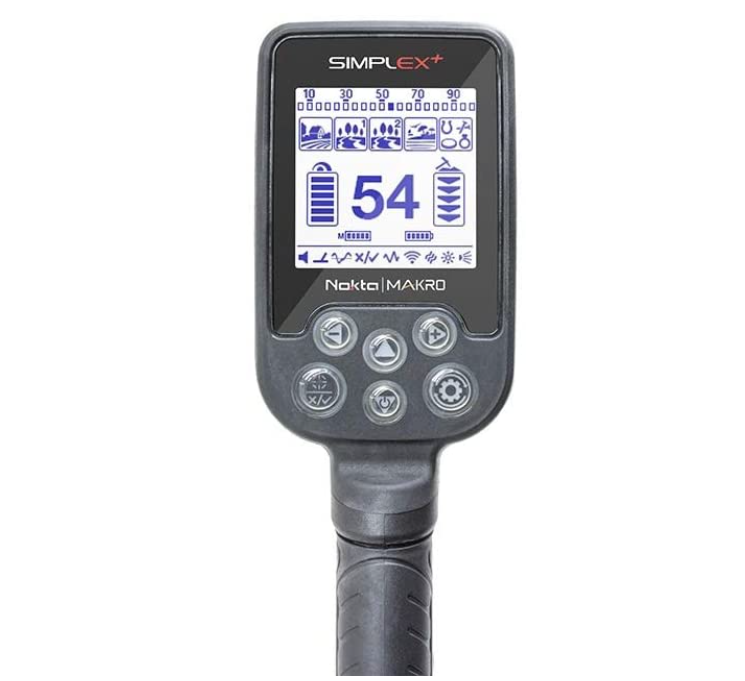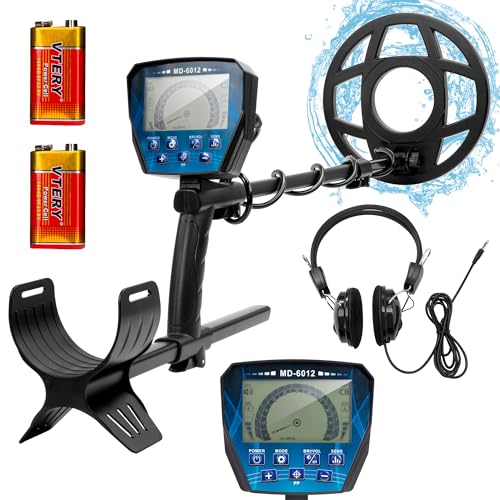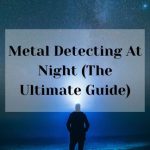
Metal detecting can be one of the most rewarding hobbies you can do, but for a large group of people it can also be a frustrating one too. Statistics show that the vast majority of participants in the hobby are 50 plus and getting to this age brings a lot of benefits but also a many issues. One of them being hearing loss. For that reason we will take an in-depth look at metal detectors for the hearing impaired and what things we can do to help make this activity open to all.
It is fairly obvious that if you can’t hear the signals coming from your detector, then you will miss out on many of the treasures buried beneath your feet. So to increase your chances of finding that treasure we will take a look at some of the aids, detectors, and things you can do, to improve your detecting experience.
So What Exactly Is Hearing Loss?
An all too common problem, hearing loss has 4 main causes. It can be caused by noise exposure, the age of the person, disease, or family genetics. Many people with this complaint have difficulty having conversations, hearing doorbells or the telephone, as well as hearing the audio signals from their metal detector.

Approximately 1 in 3 people between the ages of 64 and 74 have some level of hearing loss. And sadly, over half of the 75 and over have difficulty hearing.
How Does This Affect Metal Detectorists?
Most of us would agree that metal detecting should be available to all. But due to the very nature of metal detecting machines, this can be a problem for people with hearing problems. The reason that most experienced detectorists wear headphones, is to cut out all the environmental noise so they can pinpoint exactly what their machine has found.

Generally speaking, when you suffer from hearing loss, you will tend to suffer a loss at the high-frequency level, and over time that will get progressively worse right across the frequency range.
So the problem we have, especially with a multi-tone detector, is that the operator will hear the higher-pitched frequency signals less or sometimes not at all. There is a good chance that the other sound ranges will be affected too, depending on the severity of the hearing loss.
So when using a detector that has the higher pitch flute-like sounds that help you to decide whether to start digging or not, it will not be heard correctly, resulting in many missed targets.
What Are Our Options?
Luckily there are few things we can do to help with this issue. Many of the metal detectors for the hearing impaired on the market have a vibration facility built-in, as well as having excellent detailed displays to indicate what has been detected. There are also other devices and gadgets available to the deaf and hard of hearing community, that can be used or adapted to suit the detectorist. Also, there have been some amazing technological advancements, especially in the Bluetooth area, which we can use or have been incorporated into the detector itself. Lets take a look at a couple of the best metal detectors for the hearing impaired.
THE BEST METAL DETECTORS FOR THE HEARING IMPAIRED
Nokta Makro Simplex
Not only is this a great detector for many reasons, but it is also probably the number one choice when looking at metal detectors for the hearing impaired, due to its excellent and responsive vibration facility as well as its inbuilt Bluetooth capabilities.
The Vibration Feature
The Simplex vibration system is truly amazing. Built into the handle of the device, it provides feedback to the user when a target is detected. This feature can be used independently or it can also be used along with the audio signals. It also allows the user to disable the audio and just rely on the vibration response.
Not only that but one of the really exciting features of this machine is that it can pair up with any Bluetooth device, so if your hearing aid has that facility, then you are onto a winner with this detector.
When the vibration is in operation the user will experience a series of vibrations when a target has been found. The strength of the vibration can vary according to things such as the depth of the item or the speed at which the detector is being swung.
The setting operates in all the search modes of the Nokta Makro Simplex, although the vibration may not be felt in the All Metal Mode with the weaker signals, where an audio tone would be heard. Therefore if you are just using the vibration setting only, some of the weaker signals from smaller or deeper targets could be missed.
The Display

It has an easy-to-read display and is very user-friendly. It has six buttons to adjust the device to your required settings. These include volume, ground balance, and vibration mode among others. All of these settings are adjusted by simply pressing the buttons.
Features
- Totally submersible up to 3 meters (10 ft) and totally waterproof
- Iron Volume – Turns off or adjust the volume of the low iron tone.
- Features a Notch Discrimination setting – Discriminates Target IDs of unwanted items.
- Vibration feature, Ideal for the Hearing Impaired
- Bluetooth enabled so can link to compatible devices
- 3 Different Search Modes – All Metal -Field-Park -Beach
- Fabulous Lighting for Night & Underwater Use
- SIMPLEX+ has it all – LCD Backlight, Keypad Backlight, and LED Flashlight, Vibration and Bluetooth
Verdict.
The Nokta Makro Simplex can be considered a breakthrough detector for the hearing impaired detectorist. You not only get the ability to link to a Bluetooth device, such as your hearing aid but along with that you also get the incredible responsive vibration facility which can be used with audio or without. And not only that you will be getting one of the best, most feature-packed detectors in its price range.
- IP68 - Fully submersible up to 3 meters and protected against full dust penetration.
- Iron volume: turns off or adjusts the volume of the low tone of the iron.
- Notch discrimination: discriminates against target identifiers from unwanted metals.
- Search modes: all metals, field, park, beach
- Fabulous lighting for night and underwater use - SIMPLEX+ has everything you need: LCD backlight, keyboard backlight and LED flashlight.
Nokta Makro Anfibio
The Nokta Makro Antibio is a great detector from the Nokta Makro stable and once again a great detector packed with all the features you will ever need. Predominately made for underwater detecting (up to 16ft) but because of this, it has a great vibration feature built-in. This model also features a slightly larger screen than the Simplex+.
The Vibration Feature
Once again this vibration alerts the user when a target is detected. It can be used independently to the audio response or it can be used in conjunction with it. So when the audio is disabled, all feedback on the targets is provided as vibration in the handle.
This vibration can be adjusted and even switched off should you wish. The magnitude of the vibration is in direct relation to the depth of the target found, so once you get accustomed to the signals, it can tell you the depth you need to dig.
Display

As we have said this model has a large easy-to-use single menu display. It also has an awesome keypad backlight to help you out when the light is failing. It is easy to read and follow along with everything your detector is telling you from a visual perspective.
Features
- Nokta Makro Anfibio Underwater Metal Detector with 11″ Waterproof DD Search Coil, Wireless Headphones, Coil Cover, USB Cable, AC Charger
- The detector is fully submersible up to 5 meters (16. 4ft. )
- Excellent Discrimination so you save time by detecting the targets you want and spending less time digging.
- Great Beach Mode. Very stable in dry sand, wet sand, and underwater.
- Vibration Alert
- Bluetooth Enabled
Verdict
This is an excellent top-of-the-range detector. IT has all the features any hearing-impaired detectorist would need. With an adjustable vibration feature as well as the ability to Bluetooth to suitable devices, it ticks all the boxes. And that’s not even going into the impressive detecting features that this detector has.
- INCLUDES: Nokta Makro Anfibio Multi Underwater Metal Detector with 11" Waterproof DD Search Coil, Wireless Headphones, Coil Cover, USB Cable, AC Charger, and a Two-Year .
- Fully submersible up to 5 meters (16. 4ft. ) - IP68. Fully waterproof and protected from total dust ingress.
- Excellent Discrimination and Unmasking Ability. Save time by detecting the targets you want while spending less time digging.
- Advanced Beach Mode. Very stable operation in dry sand, wet sand and underwater.
- 9 Search Modes. GEN Delta / 2 Tone / 3 Tone / 4 Tone / 5 Tone / 99 Tone / Beach / Deep / Cache
Vibration Add On Device
There is a great little gadget on the market called the Vibra Phone 280, which has been specially developed for the hearing impaired detectorist. This is a sound-to-vibration converter that you can attach to your machine. This is a good option if you already have a metal detector but it doesn’t have the vibration feature that you need. This is also another great option for anyone who doesn’t like to wear headphones. It is also ideal for those people who struggle to hear the different tones and whistles that come from their detector.

This cool gadget takes the tone that you would normally hear through your headphones, via the headphone jack, and converts it into vibrations.
The distance between the pulses and the sensitivity can be adjusted to match the detector you are using, so once you are used to the different responses you will miss fewer targets and find more stuff.
Easy to fit on most detectors that have a headphone jack and powered by a standard 9-volt battery, this little device could be the answer to your prayers. Although I believe this product is no longer being produced, you may be able to find it by searching on Google or eBay.
Bluetooth Detectors
For a lot of people who wear hearing aids but don’t want to wear headphones, the Bluetooth capabilities of some detectors are a godsend. If your hearing aids have Bluetooth then they should be able to pair up with a machine that has this feature.
Bluetooth hearing aids have been specifically designed to connect to other Bluetooth-compatible devices, such as mobile phones and audio players. This allows the user to listen to the audio without having to use things like earbuds or headphones.
The Minelab Equinox series of metal detectors, as well as the Nokta Makro brand, have some great Bluetooth-compatible machines available should you choose this route.
Behind The Ear Hearing Aids
If you have a set of traditional Behind the Ear hearing aids, what are your options? You can get connectors called Direct Audio Input Boots, which can correspond to your particular make or model of hearing aid. These boots will then enable you to connect a wire from the bottom of the hearing aid to the headphone jack of your detector.

The advantage of using this setup is that as the boot is made especially for your hearing aids so the sounds and the different tones that come from your detector, should be a much truer sound than just listening to a set of headphones.
Portable Neck Loop
Another great option is to use a thing called a Portable Neck Loop. These can be purchased as a hard-wired or Bluetooth option and they are worn around the neck.

This enables the detectorist to connect to the headphone output jack and stream the signal to their hearing aids via a special T loop setting on the hearing aid. If you find that your aids do not have this facility it could be worth contacting your audiologist to enquire if this could be added.
There are some reports of a slight delay with the Bluetooth version, so the wired option, although not as user-friendly, could be the better choice.
What Should You Change On Your Metal Detector?
So we have taken a look at the best metal detectors for the hearing impaired, along with some other things, you can buy to help people with hearing loss metal detect, what can we do to the actual detector itself?
One thing you could do is to change the detectors setting to a single tone, which will make detection easier. As we have already said, with a loss of hearing some frequencies are missing from a person’s hearing range. Of course, doing this doesn’t come without its problems. This may mean that you will miss some of the tonal information coming from your machine, but this is preferable to hearing no tone at all.
Another thing you can do is to become familiar with your metal detector display. Make sure you fully understand the display and everything it is showing you. Do plenty of research, even before you buy the machine, and read the manual. Youtube is another great place to discover little tips and tricks you can do to get the best from your detector.
Detectors We Recommend For The Hearing Impaired
Final Word
We hope this has gone some way to explaining how people who suffer from this, can find the best metal detectors for the hearing impaired. So they can discover the joys that metal detecting can bring. And it also shows how important our hearing is in day-to-day activities.

We should also be aware of the effect long detecting sessions can have on our senses. These long sessions should be broken up with rest periods every few hours to give our senses a chance to adjust.
Over a certain amount of time, we can lose our ability to properly process and differentiate between the different sounds we are hearing. This, along with, intense concentration levels could cause problems such as fatigue and other problems in the future, so we need to bear this in mind.

















